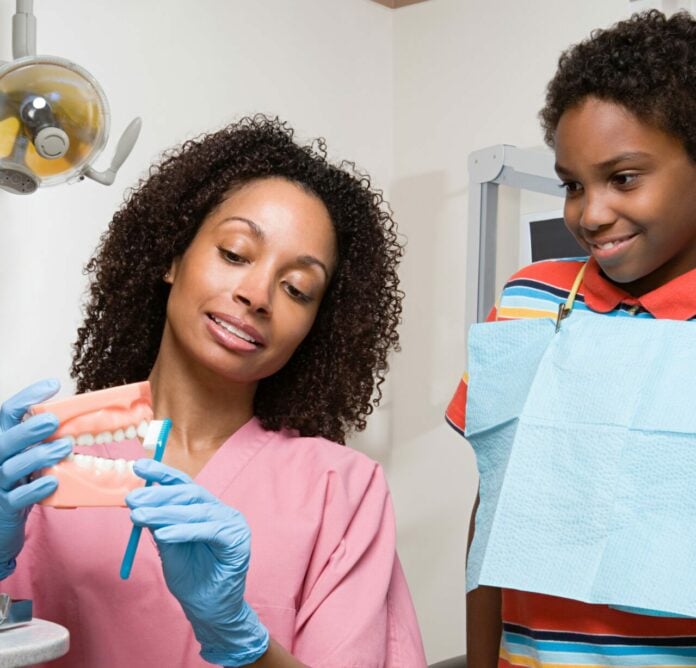Local dentists are helping families make sure kid’ teeth are healthy before the Tooth Fairy comes to collect.
February is National Children’s Dental Health Month, so the Recorder sat down with a few dentists in the community to brush up on some important hygiene tips every parent should know in caring for their child’s teeth.
Dr. Jordan Crowe, an Indy-based pediatric dentist, said her first piece of advice to parents is early intervention. Dentists want to see a child about six months after their first tooth comes in or at one year old, whichever comes first, she said.
“It’s just a really good time to kind of check in with families and talk about habits they may have at home, dietary habits, if they’re taking any medicines or getting exposure to fluoride,” she said. “It’s about moderation and making sure we’re getting the appropriate amount of exposure. So, early intervention is probably the number one thing.”
Dr. Brooke Scott, a general dentist and owner of Scott Dentistry, said it is important to continue to bring younger kids into the dentist every six months, even if it is just to get them used to the dentist.
“At those appointments, most dentists we call it happy visits, and so we have the patient come in, see if they’ll let us brush their teeth, let them play with the toothbrush a little bit, get a feel for what it is like at home,” Scott said. “We’ll talk about techniques, how to allow the kid to let you brush, also are they spitting?”
How often should kids brush?
Everyone, regardless of age, should be brushing their teeth twice a day for at least two minutes each, Scott and Crowe said. However, if for any reason, a child is only able to brush once a day, it is best to do it at night.
One of the biggest decisions is when to start incorporating fluoride, Scott said. If a child is still swallowing toothpaste or is not used to spiting it out, she said it is best to use a non-fluoridated toothpaste until they can spit.
READ MORE: Policy and progress: Food justice in Indiana
“Now typically fluoride honestly doesn’t cause much problems,” Scott said. “The issue is if it is ingested into the system; during development of the teeth, it can cause some issues with aesthetics. But in general, fluoride typically is going to come out through the urine.”
What about flossing?
Although most kids have teeth that are more spaced out, Crowe recommends flossing once every day where teeth touch tightly. Kids can even sing “The ABC’s” or “Happy Birthday” while they floss and brush to make it easier too. For kids who do not have the manual dexterity to floss or brush, Crowe recommends an electric toothbrush to get everything as clean as possible.
“I don’t know about other dentists, but I recommend flossing closer to the age of like eight or nine typically with baby teeth, unless you have a baby whose teeth are really close together,” Scott said. “But kids are not going to have the dexterity really to floss their teeth until a certain age, so we try to incorporate that a little later in life.”
Warning signs
For early signs of cavities, Scott and Crowe said to be on the lookout for discoloration or black and brown staining. Other warning signs include bumps on the gums, pain while eating, spontaneous pain, and red and puffy or bleeding gums.
If parents notice any of these signs, it is imperative to take the child to the dentist to get it taken care of. Even cavities in baby teeth are serious, Scott said, as they can interfere with the development of the adult tooth growing behind it if not treated.
Misconceptions about dental health
For children and adolescents, mouth guards are recommended for contact sports, Crowe said. Preventable accidents involving teeth are just part of life, but having a protective item can give parents and student athletes peace of mind.
Most people do not look at oral health as being connected to systemic or overall health, Crowe said. Seeing a dentist regularly is essential to maintaining good health across the board, especially in the Black community, where risk factors such as diabetes and hypertension can impact dental care, Scott added.
Contact staff writer Chloe McGowan at 317-762-7848. Follow her on Twitter @chloe_mcgowanxx.
Chloe McGowan is the Arts & Culture Reporter for the Indianapolis Recorder Newspaper. Originally from Columbus, OH, Chloe has a bachelor's in journalism from The Ohio State University. She is a former IndyStar Pulliam Fellow, and has previously worked for Indy Maven, The Lantern, and CityScene Media Group. In her free time, Chloe enjoys live theatre, reading, baking and keeping her plants alive.





